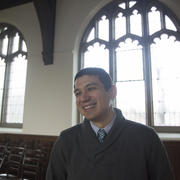
Matthew Potts, Associate Professor of Religion and Literature and of Ministry Studies at Harvard Divinity School and Affiliated Minister in the Memorial Church considers rituals of love and service in a season of social distancing.
On Maundy Thursday in my church we wash feet. It’s such a tender and (literally) touching ritual, to watch dozens of people you love remove their shoes and socks and then to kneel among them, to cradle their feet in your hands under warm water, and to have your feet cradled in their hands too. I sometimes wonder what the church might have become if footwashing had become as central a ritual as eucharist. I can understand why it didn’t; it isn’t an altogether comfortable practice. But it is a humbling and holy and loving one. And also entirely impossible this Maundy Thursday, for obvious reasons. I will miss it, as I already miss the people whose feet I might have washed.
I’m generally opposed to speaking about Easter during Holy Week. I think it’s essential during these sacred days to tarry with our sorrow at Jesus’s sufferings before rushing ahead to his resurrection. But there is something in this year’s Easter gospel from John that speaks to our moment, even to this curious Maundy Thursday moment a few days in advance of Easter. Because it’s not the Easter triumph that matters today, but the way that triumph is attenuated by sadness in John’s gospel. Mary sits weeping at the tomb, and Jesus appears, suddenly, miraculously, to console her. She reaches out to touch him, of course, to hold him, to pull the one she has loved and lost into an astonished embrace. But Jesus is firm: you cannot touch me, he says. Even on this resurrection morning, even in the midst of this victory, Mary’s love is frustrated. She cannot touch the one she loves; she cannot love in the manner she wishes.
There’s a video circulating on social media of an eighty year old man named John Kline singing hymns through a window. His wife Ann has Alzheimer’s and is in a nursing home in Alabama. Mr. Kline cannot touch Ann or hold her. He can’t even sit in the same room with her. So Mr. Kline does what he can: he stands outside her window and he sings. And when Ann hears him she sings too. And then, through the strange paradox and miracle of love, the wall that stands between them somehow magnifies rather than muffles the song of their love.
All of us are separated these days from the ones we love. My mom has cancer. Tomorrow is her birthday and she’ll be celebrating quietly with my dad instead of cheerily with her grandkids because it’s simply too risky these days for us to gather. Those parishioners whose feet I wash each year and who wash mine will be sitting with their socks on tonight, as will I. I hope they’ll be praying and missing it. I will be. But this is not a singular experience.
All of us are isolated, all of us are set at a distance from those close to our hearts, all of us are separated from those who most need our love, whose love we most need. We are all standing outside of windows these days, saddened and frustrated and facing a dreadfully lingering loss. So what song shall we start singing?
This piece appeared in the April 9, 2020 edition of "On Pilgrimage," the daily newsletter of Harvard's Memorial Church. To subscribe, visit the Memorial Church Website.
